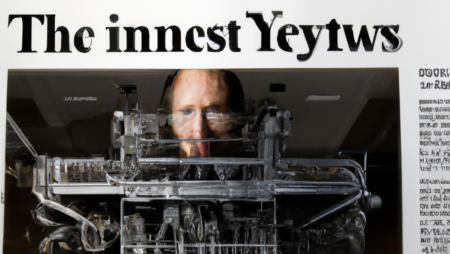How AI Retools, Rationalizes, and Reshapes Journalism and the Public Arena
New research by Oxford Internet Institute DPhil Student Felix M. Simon finds AI is having a significant and increasing impact on journalism.
In an era dominated by technological advancements, the impact of artificial intelligence (AI) on the news industry remains a subject of significant debate. A comprehensive report, drawing on 134 interviews with news workers and 36 international experts, sheds light on the complex interplay between AI, news organizations, and the public arena.
AI’s Influence Across Editorial, Commercial, and Technological Domains
Contrary to sensational claims, the report highlights that AI applications in news organisations are often more mundane than revolutionary. Rather than a silver bullet, AI is a tool that can enhance efficiency. Examples of this include dynamic paywalls, automated transcription and data analysis tools, all of which demonstrate tangible productivity gains.
However, the path to realizing these gains presents challenges. The unreliability of AI outputs, concerns about reputational damage, and the difficulty of automating certain tasks act as constraints. Professional norms, resistance from news workers, regulations, audience preferences, and existing technological infrastructures further complicate the integration of AI in news organizations.
News Organizations’ Dependence on Tech Giants
The extensive use of AI products and infrastructure from major tech companies like Google, Amazon, and Microsoft raises concerns about press freedoms and influence.
The report suggests that the complexity of AI increases platform companies’ control over news organisations, creating lock-in effects that can limit publishers’ autonomy, undermine their business positions and the visibility of news more broadly. Lack of transparency in AI systems adds to worries about biases or errors seeping into journalistic output.
Implications for News Organisations and the Public Arena
While AI can assist news workers, concerns loom about the potential for job replacement. The growing use of AI in news work tilts the balance of power away from individuals. As the technology platforms prioritise AI-enhanced search experiences and users frequently opt for short answers, audience engagement with news stories could also decrease.
The report argues that AI constitutes a retooling of the news rather than a fundamental change in the motivations of news organisations. Yet, as news organisations evolve through AI, the broader public arena, vital for democracy, also undergoes transformation. Key decision-makers, including executives, journalists, technology companies, regulatory bodies, and the public, will shape this evolving landscape.
A Call for Scrutiny and Balance
Simon suggests: “Given the widespread and powerful influence news organisations have on society, it’s important that the evolving landscape of AI in the news is navigated carefully and transparently. We also need more research to understand these developments.”
The concentration of control over AI by a small number of major technology companies is identified as a critical area for scrutiny. As AI continues to evolve, developing frameworks to balance innovation with concerns around issues like copyright and potential harms becomes a necessary but challenging task.
In conclusion, the report recommends a balanced approach, emphasizing that the effects of AI on the news industry will be neither as dire as doomsayers predict nor as utopian as enthusiasts hope.
About the research
Felix Simon conducted this research with the Tow Center For Digital Journalism, Columbia University Journalism School. The full report can be read here.




